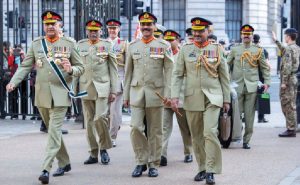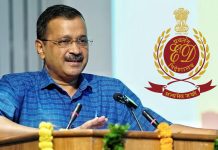 With the release of Maryam Nawaz on November 5, 2019, may lead to a rapprochement between the estranged political outfit, Pakistan Muslim League (PML)-Noon led by the three-term Prime Minister Nawaz Sharif and the establishment, which is being explained in the media as a polite definition of the power-hungry Pakistani army. The general headquarters or GHQ is the power centre, which decides the political fate of the country. Since its inception in 1947, Pakistan has been under the boots of the Muslim soldiers of the British army, which happily connived with the West for its survival.
With the release of Maryam Nawaz on November 5, 2019, may lead to a rapprochement between the estranged political outfit, Pakistan Muslim League (PML)-Noon led by the three-term Prime Minister Nawaz Sharif and the establishment, which is being explained in the media as a polite definition of the power-hungry Pakistani army. The general headquarters or GHQ is the power centre, which decides the political fate of the country. Since its inception in 1947, Pakistan has been under the boots of the Muslim soldiers of the British army, which happily connived with the West for its survival.
With the decision of Prime Minister Imran Khan, maybe advised by the GHQ, not to oppose release of Maryam, an accountability court issued release orders of Pakistan Muslim League(PML-N) leader Maryam Nawaz. Earlier, the Lahore High Court had granted bail to Maryam, the PML-N vice-president in the Chaudhry Sugar Mills (CSM) case. Justice Amjad Nazir Chaudhry issued the orders after Maryam’s counsel submitted two surety bonds of 1 lakh each. She was incarcerated in Lahore’s high security Kot Lakhpat prison. Interestingly, it is very difficult to analyse and understand the contemporary complex political situation in the country.
The roots of the problems may be understood, when ZA Bhutto, who during his tenure as the prime minister, elevated a junior general, Zia-ul-Haq, who later deposed him. The cunning army dictator also got his mentor hanged through a sham Kangaroo court in a concocted murder allegation. The history appears to be repeating in the case of Imran Khan (IK), but the controversy has other facets. The issue is that he has extended the tenure of the incumbent army chief Bajwa for another three years.
The decision has denied the claims of other generals, who will be superannuated. It appears that the GHQ is not in unison, whether IK should be allowed to complete his tenure or he should be replaced by some other civilian face. The two major political outfits, People’s Party of Pakistan (PPP) and Nawaz Sharif’s PML (Noon), have been nurtured by the GHQ during their nascent existence and also removed, when they dared to question its paramount authority. It is well-known that Z.A. Bhutto was a favourite of the Pakistani dictator, Ayub Khan. Bhutto used to call the general “papa”.
Promoting a cleric
In the contemporary Pakistani politics, the GHQ has allowed Fazlur Rehman head of the Jamiat ULema-e-Islam (JVI-F) to hold countrywide rallies against the IK government. It has become a formidable movement when a small procession became a huge congregation when it reached from Karachi to Lahore. The anti-govenrment demonstrators are rallying in Islamabad to force I.K. to quit the office of the prime minister.
In 2014, with the tacit approval of the GHQ had allowed the much-trumpeted Azadi March. It was organized by Imran Khan’s political outfit, by the Pakistan Tehreek-e-Insaf (PTI) party, opposing the then Prime Minister Nawaz Sharif over claims of massive election rigging by the ruling PML-N) in the 2013 general election. The then chief of the army staff, General Raheel Sharif was requested to facilitate an end to the crisis. The crisis was ended at a meeting between IK and the government’s representative. Interestingly, in ousting Bhutto’s People’s Party, Nawaz Sharif was helped by the army and mullahs. The circle appears to be complete, with the support now being given to JVI-F and inability of the army chief Bajwa to help IK in this political conflict.
The super power games
The Bhutto legacy in the Pakistani establishment has percolated down at different levels, though his party is not in power. He had initiated close proximity with China even during the military regimes in Pakistan, especially to harass India in the northeastern region. From the military cantonments of East Pakistan (now Bangladesh), Pakistani army was providing military and civil supplies to the Naga and Mizo insurgents. It also facilitated their training in China.
The historic visit of US president Richard Nixon to China was finalized by his National Security Advisor, Henry Kissinger, in July 1971, who had quietly sneaked to China during a trip to Pakistan. This nearly half-a-century alliance with China has made it less dependent upon the west.
The crucial role of Pakistan is well-known in ousting the communists from Afghanistan. It received liberal funding from the US-led western powers for promoting Islamic JIhadfis and terrorists. However, the western world now wants that the terrorism must be contained and the liberal funding to Pakistan has been stopped. It has led it to depend much more on the Chinese financial assistance.
It is a piquant situation in Pakistan. The Chinese prefer to support the GHQ and they have no hesitation, though ideologically opposed to religious parties’ role in the governance, to ally with the Islamic fundamentalists. The civil society in Pakistan, mostly influenced by the West and liberal democracies, is unable to resolve the dilemma of allying with the West or go with China.
The huge Chinese presence in Balochistan, though opposed by most of the locals, has already unnerved eminent journalists like Hassan Nissar and Nazam Sethi and many others. The IK has to go, but the key to the power game is in the GHQ. It cannot be ruled out that Maryam may replace IK, but the process of this transfer needs political strategy, which Bajwa may not be able to work out.
letters@tehelka.com












